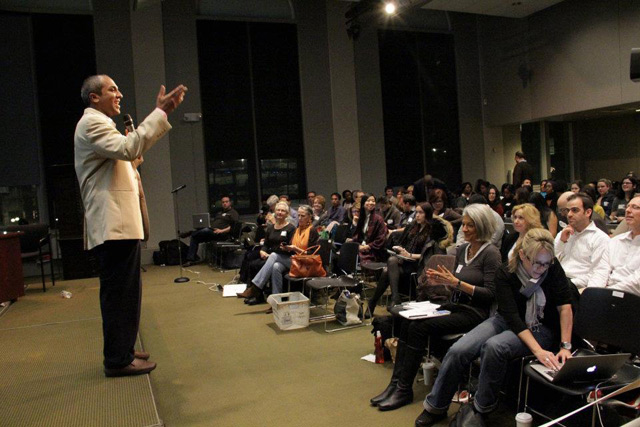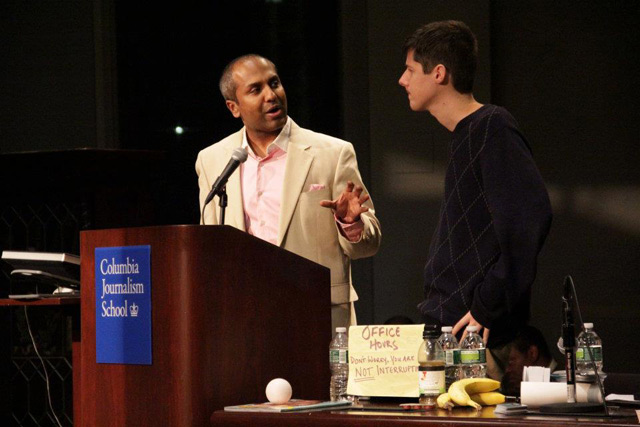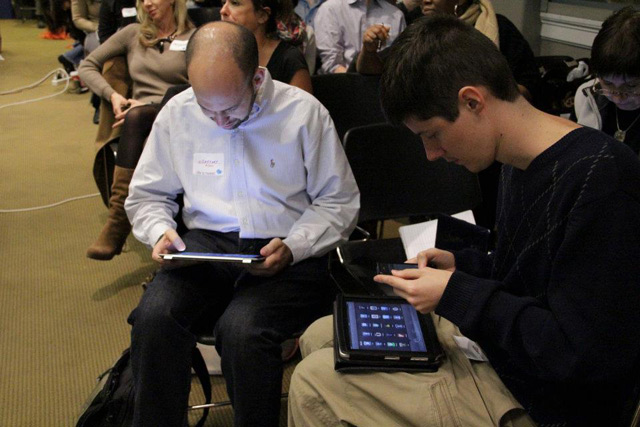Is it better for a writer to focus only on developing their craft, or also on understanding how to build and engage an audience? This is a debate that has been thriving online this year in the writing community, so I thought I would address the topic today.
The latter issue here: “building and engaging an audience” has been disparaged by using terms such as “branding,” “marketing,” “platform” and similar words. The implication is: Should Bob Dylan have spent his time in 1962 writing songs, or designing ads for his album? Does a writer corrupt their work by focusing on marketing instead of creating an amazing work of art and craft?
So for writers, I’ll also take the easy way out: For me, the answer is clearly to focus on both creating one’s work, and connecting their work to the world. Why? Because doing so provides two things that are incredibly powerful, and somewhat rare:
- Confidence.
- Turning intention into reality. That lots of folks TALK about having a writing career, but many of them treat their work as a hobby. That many other things take precedence to the millions of things it takes to become a successful writer.
That an inherent part of building and engaging an audience is sharing. That without sharing one’s work, it runs the risk of dying in a vacuum. Twenty years ago, that vacuum was a manuscript at the bottom of a desk drawer. Today, it is a lonely word processing file on your hard drive. Never shared, never improved based on the outside world, forever trapped in an endless and closed process of revisions. That, even a work that is only shared in writing workshops, and never “published” to readers, is a work that perhaps has no end. There is always another edit that can be made.
For many writers, that keeps their work “pure,” because it is not complete. So they don’t have to wrestle with the hard choices about publishing, marketing, connecting – because as they will tell you: “that is putting the cart before the horse.” But if a piece of writing is never completed, always in revisions, then how can it impact the world, and build your legacy as a writer?
While Bob Dylan did not spend 1962 designing ads for his work, he did spend his time in cafés, performing, speaking to those who had similar beliefs, exploring other musicians, and engaging in the world around him. He was intentional to get his music in front of others, to be where he needed to be, to meet the right people. When I speak about a writer building and engaging an audience, these are the types of activities I refer to. To be present in the community you hope that your work has an effect on. Not to be simplifying one’s work and exploiting it in exchange for money. (that’s just icky)
If A Book is Published in a Forest…
But the real risk is that once a work is ready to be shared, is if the author has no skills or foundation by which to get people to read it. So the work dies.
The act of “publishing” is not the critical part of being a writer, it is the act of being read.
The process by which their stories and ideas spread, and truly impact the world.
I have heard this chant at writing conferences and writing blogs again and again: “Write the best book possible.” “Focus only on your craft, and the world will eventually find your work and reward you.”
Bullsh*t.
I’m at the age where I remember a world before the internet. A world where it wasn’t assumed that everyone would have “followers.” Where people wouldn’t complain at “only” having 48 followers, a world where that would be INCREDIBLE to have 48 followers!
When I was a kid I was an artist. When I was a teenager I began writing poetry and other forms of what was called creative writing. I got into photography. In college, I published a music fanzine, which occupied far more of my resources than college work did. (sorry mom and dad) In my twenties I became (a very poor) musician, and created a series of (unpublished) pop up books. Since then, I have gotten more and more into nonfiction writing.
Through each of these projects, I remember how hard it was to not just create the work, but to connect it with others who may appreciate it. That for many writers, artists, and musicians I knew, their work only got polite attention from friends and family. Is that enough? If you are a writer who has written for four decades, is that enough for you? That when you die, your legacy dies with you because your work never found an audience?
What is This Dreaded Word “Branding,” Anyway?
To me: “branding” is about learning how to communicate one’s purpose, the value of their work, and connecting that to the world. Not to change one’s work because of the world, just connecting to it. That many creatives stumble when asked about their novel, their art, their music. They give long convoluted explanations, half-apologizing along the way.
When you know what you are about, when you know how it taps into what others are passionate about, then you are able to make powerful and meaningful connections.
No, I’m not afraid of the word “branding” because it’s just a word. What you make of it – something restrictive or something empowering – is up to each individual. When I work with writers to develop their “brand” – it is never about putting a fake surface on top of their work. It’s always about cutting to the heart of their purpose, of the power of their work, and how that resonates in others – how it connects to the hopes and dreams of those they intend to connect with. It’s not about creating “fans.” That is a one way relationship. It’s about becoming a part of something. Together making a whole.
Building one’s platform is not about marketing. It’s NOT about creating an engine to constantly pitch others. It’s simply about being present. For me, it’s about real connections. I post my cell phone number all over the web and social media when connecting with others. Why? To show that I am a real person, and I want to connect with like-minded people. That there isn’t a barrier between us called “social media.” That I am not using social media how some people use their cars: as a barrier between themselves and others that allows you to assuage the guilt of cutting others off, speeding in a school zone, and honking.
If you call 973-981-8882, I’ll pick up. But please, I have a 1 year old at home, so call at reasonable hours!
Confidence and the Creative Process
What I believe in is a process of iteration. Where you create the best work you can, and then share it. Then you learn from that process, and create a new work as best you can, and share it. If you are forever trapped in the process of creation without sharing, without publishing and building the skills to do so, you jeopardize your entire legacy.
You don’t build a legacy based on intentions, but rather on actions.
The process of iteration challenges you in ways that are uncomfortable. But if you are open to it, you develop confidence. The confidence of a creator, and the confidence of someone who can clearly communicate the purpose and value of their work with the right people.
The reasons for this are best described on page 30 of Steve Jobs’ biography, as Jobs describes how creating and selling little illegal pieces of hardware called “Blue Boxes” to college students gave him the necessary ingredient to build a company that would change the world:
“If it hadn’t been for the Blue Boxes, there wouldn’t have been an Apple,” Jobs later reflected. “I’m 100% sure of that. Woz and I learned how to work together, and we gained the confidence that we could solve technical problems and actually put something into production.” They had created a device with a little circuit board that could control billions of dollars’ worth of infrastructure. “You cannot believe how much confidence that gave us.” Woz came to the same conclusion: “It was probably a bad idea selling them, but it gave us a taste of what we could do with my engineering skills and his vision.”
Why do I advocate that writers, artists and creators put their work out there? To focus on connecting with their audience? Because it validates. Because it teaches. It educates. Because it – sometimes slowly – builds confidence.
It also gives you a fuller view of the complexity and value of your work in the world – not just in your mind. That sales is a part of a book’s lifespan. That reaction is an important part of a work. That this inherently challenges the writer/artist/creator. That it takes your work out of the locked bedroom, and sees if it has wings – a chance to grow beyond ourselves.
Is this true for every creative work? No. Some books, some albums should be created in a pure vacuum. But the critical thing is that they are shared, and the artist goes back to the studio to craft something new. I do not think that Dylan’s early career would have improved by committee, or by responding to polls and research of his audience. He pushed others in ways that were uncomfortable, and forced them to evolve in the process.
In fact, many are huge fans of his early work, but his later work (after he has put in Gladwell’s 10,000 hours) resonated with a much more limited audience. Is this bad because he didn’t create popular work? Is this good because he followed his own artistic vision? Not an easy question to answer. If you go see Dylan live, do you want to hear “The Times They Are A Changin” or do you want to hear his 1988 album ‘Down in the Groove’ in it’s entirety, ignoring all of his work from the 1960s and 70s?
Many say they don’t care about popularity, but are they saying they don’t want to be appreciated either? This answer is different for every writer, artist, and musician. And we can’t assume one person’s answer holds true for others. But what keeps someone continuing to create even when they have found no real success with their previous work?
I was lucky that my early creative work was supported and encouraged by friends, family, and the community I was a part of. Their support gave me the confidence I needed to continue to create. I think that is a major hurdle for most writers, musicians and artists. We covet. We fear. We find excuses. We get trapped in revisions. Trapped in waiting for just one more thing to do before we share it.
Create, Publish, Learn, Evolve, Repeat
I’ve talked in the past about principles of the lean startup movement, and it 100% applies here. Of not just developing your brilliant idea, but developing a feedback loop, and getting comfortable putting your ideas out there – of making creation a social process where the needs of others are built into it. You need to develop a process that helps you work past points of failure. Any story of greatness is often riddled with moments where it easily could have all fallen apart, but they had the skills to move past it to find success. You need that. We all need that!
Should the Beatles have never released an album until Sgt. Pepper? Until they had created a masterpiece? That is how some writers approach their career. All of their eggs are in one basket, instead of building a variety of skills, including learning how to share your work to find readers, not just an agent or publisher.
You have to launch to grow.
The Myth of Quality
Another part of this discussion that is often overlooked is that quality is subjective. That what one person loves, another hates. I have been to writing conferences where an author in the audience proclaims that their book is indeed the best it can be, and is better than anyone else could write it. But the topic was somehow repellent to others; there was nothing offensive about their work, it was just a topic that didn’t resonate, a cover design that didn’t resonate. I saw others actively trying to get away from conversations from this particular author. So here this person had a book they felt was great, but people were running for the hills. Was that due to the quality of the work, or their inability to communicate it’s value?
When you can’t communicate the value of your work, how can others experience its quality?
Likewise, we tend to equate the amount of time we spend honing something with the level of quality we are instilling in it. But quality and time have nothing to do with each other. Great works can be created in a moment, and no amount of editing and revision could have improved them. The hardest decision an artist makes is knowing when to put down the brush, when one more stroke will not bring to life their creative vision, but begin to destroy it.
Build the Bridge Before You Need It
One other way I want to look at this topic – considering whether a writer should focus on how they communicate their message, not just develop their craft – is to consider how they manage their writing career. So let’s consider how non-writers tend to manage their careers. You know: regular people you see day to day. This is how most careers are managed:
Someone works hard to find a job.
They get the job.
They work hard to ensure they don’t get fired.
They do good work.
They get comfortable.
They have no time for anything outside of work.
They build relationships ONLY within their company.
They build skills ONLY applicable to a very specific role within a very specific company.
They never learn to communicate to others outside of the company what they do. They rely on a business card and a title to say it all.
But then…
They get laid off.
And suddenly, they dust off their resume that hasn’t been updated in years.
They stop making fun of how boring LinkedIn is, and try to build their connections there.
They start calling people they haven’t spoken to in years.
They go to meetups in their industry that they have never even considered going to before.
They send out hundreds of resumes.
They panic, they get depressed.
They lose their identity.
But then…
They get a new job, and repeat the entire process above again.
That, oftentimes we eschew things like “branding” and “marketing” because we don’t need them at the moment. We feel pure without them. But… when your perfect work is finally done, finally published, and [if] it languishes on the shelves, suddenly, marketing becomes an interesting topic.
But is it too late by then?
Getting read and finding an audience is not about branding and marketing – it is about communication.
We See What We Want to See
We each have different heroes, and different worldviews. In the end, we will all see exactly what we want to see. I imagine Joe Konrath will tend to see stories in the world that prove self-publishing is the answer. Others see their own story – perhaps that the writer should never ever consider the marketing or business aspects of publishing. And you know what, everyone is right. What is right for you, is wrong for someone else. There is not one answer in publishing. Should you let branding and author platform kill your creative process? Of course not. Leverage them if you want. Ignore them if you want. But make a personal choice, not a black and white view of what is right for others.
So let’s all just hug and get on with writing, reading, and perhaps sharing some good conversation over hot cocoa.
-Dan



